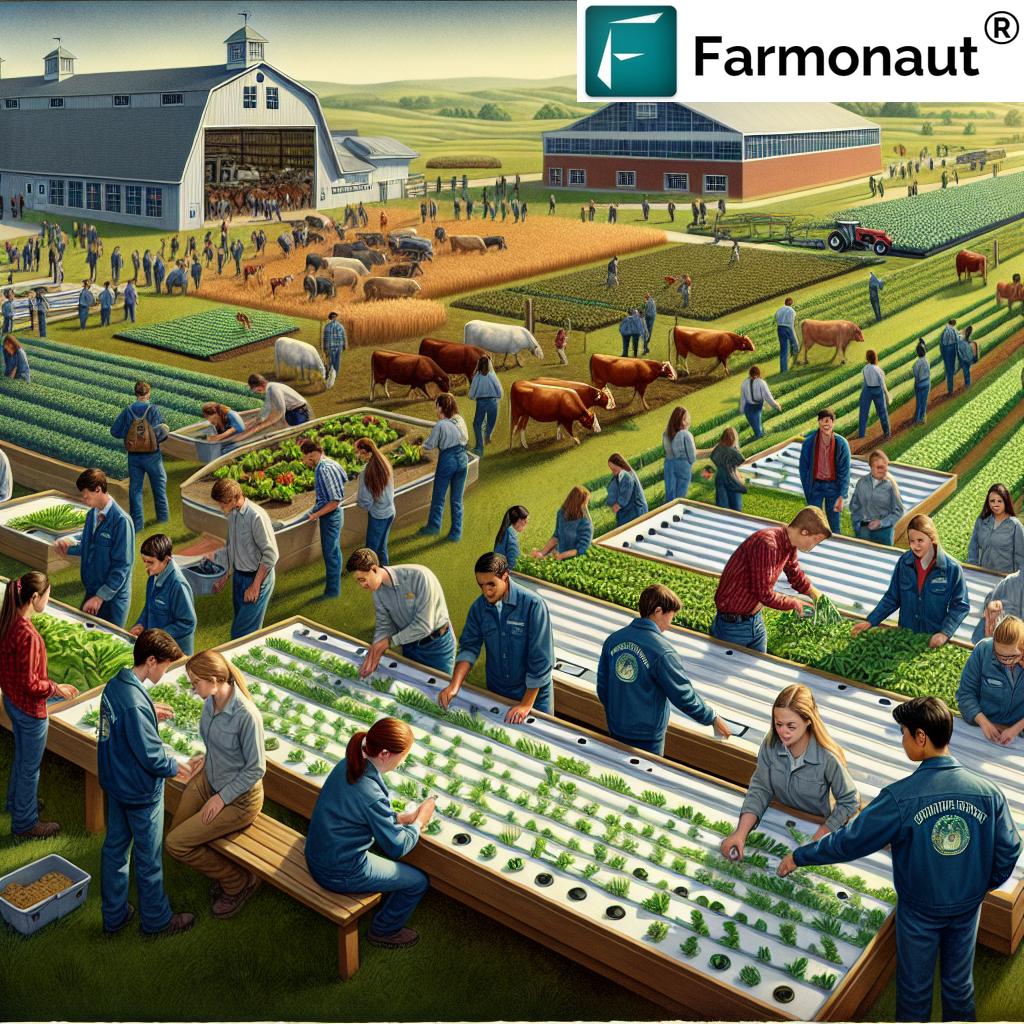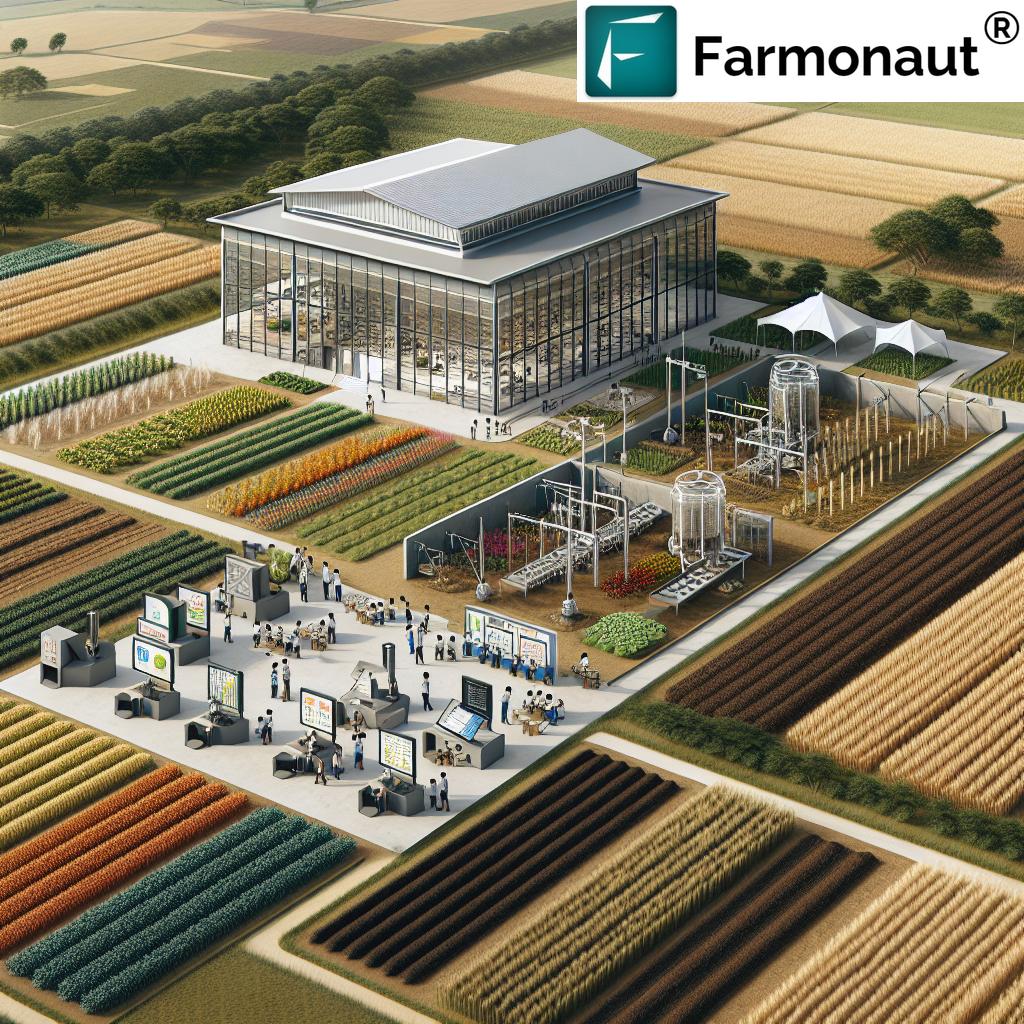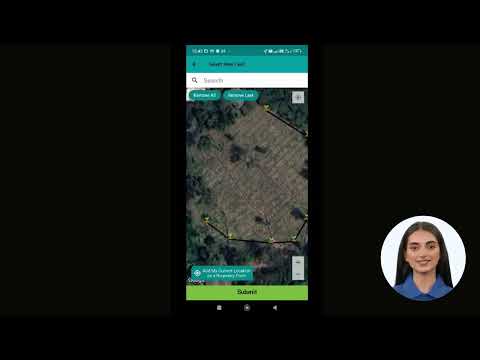Revolutionizing Agricultural Education: How Southern High’s FFA Chapter Transforms Farms into Living Laboratories
“Southern High’s FFA chapter operates a living laboratory, combining over 10 different agricultural practices from traditional to modern techniques.”
In the heart of the Midwest, a remarkable transformation is taking place in agricultural education. We’re witnessing the dawn of a new era where traditional farming methods seamlessly blend with cutting-edge technology, creating a dynamic learning environment for the next generation of farmers. At the forefront of this revolution is Southern High’s FFA chapter, which has ingeniously turned local farms into living laboratories, providing students with an unparalleled hands-on farming experience.
As we delve into this innovative approach, we’ll explore how this FFA chapter is not just cultivating crops, but also nurturing the future of agriculture in our great nation. From the fertile fields of Illinois to the vast prairies of Kansas, this educational model is taking root, promising to yield a harvest of skilled, tech-savvy agricultural professionals.
The Living Laboratory Concept: Bridging Theory and Practice
At the core of Southern High’s revolutionary program is the concept of the living laboratory farm. This innovative approach transforms ordinary farms into dynamic classrooms, where textbook knowledge comes to life amidst rows of corn and soybean fields. Here, students don’t just learn about agriculture; they live it, breathe it, and quite literally, get their hands dirty in it.

In these living laboratories, students engage in a wide range of activities that mirror real-world farming operations. From planting and harvesting crops to managing livestock, every aspect of farm life becomes an opportunity for learning. This hands-on approach not only reinforces classroom teachings but also instills a deep appreciation for the complexities and rewards of modern agriculture.
Integrating Agricultural Technology in Schools
One of the most exciting aspects of Southern High’s program is its emphasis on integrating agricultural technology in schools. In an era where precision farming and data-driven decision-making are becoming the norm, exposing students to these technologies is crucial. Here’s how the program is bridging the gap between traditional farming methods and contemporary practices:
- Satellite-based crop monitoring: Students learn to use advanced platforms like Farmonaut to track crop health and make informed decisions.
- Drone technology: Aerial surveys and precision application of inputs are taught using state-of-the-art drones.
- IoT sensors: The program incorporates Internet of Things devices to monitor soil moisture, temperature, and other critical parameters.
- Data analytics: Students learn to interpret and apply data to optimize farm operations and increase yields.
By incorporating these technologies, the FFA chapter ensures that students are well-prepared for the future of farming, where technology plays an increasingly pivotal role.
Hands-On Farm Operations Training: From Seed to Harvest
The heart of Southern High’s program lies in its comprehensive farm operations training. Students don’t just observe; they actively participate in every stage of the farming process. This hands-on approach covers a wide spectrum of agricultural activities:
- Soil preparation and analysis
- Seed selection and planting techniques
- Irrigation management
- Pest and disease control
- Harvesting methods
- Post-harvest handling and storage
Through this immersive experience, students gain a holistic understanding of the agricultural cycle, preparing them for careers in farming, agribusiness, and related fields.
The Aquaponics Revolution: Bringing Sustainable Farming to the Classroom
One of the most innovative aspects of Southern High’s program is the integration of an aquaponics system in the classroom. This cutting-edge approach to sustainable farming combines aquaculture (raising fish) with hydroponics (growing plants in water) in a symbiotic environment. The aquaponics system serves as a microcosm of ecosystem management, teaching students about:
- Nutrient cycling in closed systems
- Water conservation techniques
- Sustainable protein production
- Plant growth in soilless mediums
This hands-on experience with aquaponics not only broadens students’ understanding of agricultural systems but also introduces them to innovative solutions for food production in urban or water-scarce environments.

“Students in this innovative program gain experience with at least 5 different types of farm equipment and manage multiple crop varieties.”
Developing Practical Agricultural Skills for the 21st Century
The FFA chapter’s program goes beyond traditional farming practices to equip students with a diverse set of practical agricultural skills essential for success in the modern agricultural landscape. These skills include:
- Operating and maintaining advanced farm equipment
- Implementing precision agriculture techniques
- Understanding and applying agricultural data analytics
- Practicing sustainable farming methods
- Developing problem-solving skills in real-world agricultural scenarios
By mastering these skills, students are not just prepared for traditional farming roles but are also equipped to take on leadership positions in agricultural technology firms, research institutions, and policy-making bodies.
Fostering Entrepreneurial Spirit through Agricultural Fundraising
Agricultural fundraising is an integral part of the FFA chapter’s program, serving a dual purpose of supporting the chapter’s activities and instilling entrepreneurial skills in students. These fundraising initiatives often take the form of:
- Community farmers’ markets
- Plant and produce sales
- Farm-to-table events
- Agricultural product development and marketing
Through these activities, students learn valuable lessons in business planning, marketing, financial management, and community engagement – all within the context of agriculture.
Embracing Modern Farming Techniques: A Bridge to the Future
As agriculture evolves, so too must agricultural education. Southern High’s FFA chapter is at the forefront of incorporating modern farming techniques into its curriculum. This forward-thinking approach includes:
- Vertical farming practices
- Precision agriculture using GPS and GIS technologies
- Automated irrigation systems
- Robotic harvesting techniques
- Biotechnology and genetic improvement methods
By exposing students to these cutting-edge techniques, the program ensures that they are well-prepared to lead the agricultural industry into a technologically advanced and sustainable future.
The Role of Technology in Enhancing Agricultural Education
In today’s digital age, technology plays a crucial role in agricultural education. Southern High’s FFA chapter leverages various technological tools to enhance the learning experience:
- Farmonaut’s satellite-based crop monitoring: Students use this advanced platform to track crop health, soil moisture, and other vital parameters in real-time.

- Mobile apps for field data collection: These apps allow students to record and analyze data on the go, improving efficiency and accuracy in farm management.


- Virtual reality simulations: These provide immersive experiences in various agricultural scenarios, from equipment operation to crop disease diagnosis.
- Weather forecasting and climate modeling tools: Students learn to interpret and apply weather data to make informed farming decisions.
By integrating these technological tools, the program prepares students for the digital transformation of agriculture, ensuring they are ready to leverage technology in their future careers.
Cultivating Community Involvement and Support
The success of Southern High’s FFA chapter is not just limited to its innovative curriculum; it also lies in its strong community involvement. The program has fostered partnerships with:
- Local farmers who provide access to their lands for hands-on learning
- Agricultural businesses that offer internships and mentorship opportunities
- Research institutions that collaborate on cutting-edge agricultural projects
- Government agencies that provide resources and support for sustainable farming initiatives
These partnerships not only enhance the educational experience but also create a supportive ecosystem that nurtures the next generation of agricultural leaders.
Preparing Students for Diverse Careers in Agriculture
One of the most significant advantages of Southern High’s program is its ability to prepare students for a wide range of careers in agriculture. The comprehensive nature of the curriculum, combined with hands-on experience and exposure to modern technologies, opens doors to various career paths:
- Traditional farming and ranching
- Agribusiness management
- Agricultural technology development
- Sustainable agriculture consulting
- Agricultural policy and advocacy
- Food science and technology
- Agricultural education and research
This diverse career preparation ensures that students are well-equipped to meet the evolving needs of the agricultural sector, whether they choose to work on a family farm or in a high-tech agricultural startup.
The Impact of Farmonaut’s Solutions on Agricultural Education
Farmonaut’s advanced agricultural solutions play a crucial role in enhancing the educational experience at Southern High’s FFA chapter. By integrating Farmonaut’s technology into the curriculum, students gain hands-on experience with state-of-the-art tools used in modern precision agriculture. Here’s how Farmonaut’s solutions are making a difference:
- Satellite-Based Crop Monitoring: Students use Farmonaut’s platform to analyze multispectral satellite images, learning to interpret vegetation health indices and make data-driven decisions about crop management.
- AI-Powered Advisory System: The Jeevn AI system provides students with real-time insights and personalized recommendations, teaching them how to leverage artificial intelligence in farm management.
- Blockchain Traceability: Students explore the concept of supply chain transparency using Farmonaut’s blockchain solutions, understanding its importance in modern agribusiness.
- Resource Management Tools: Farmonaut’s fleet and resource management features give students practical experience in optimizing farm operations and logistics.
- Environmental Impact Assessment: The carbon footprinting tool allows students to understand and quantify the environmental impact of various farming practices, promoting sustainable agriculture.
By incorporating these advanced tools into their learning, students are not just gaining theoretical knowledge but are also developing practical skills that are highly valued in the modern agricultural industry. This integration of Farmonaut’s technology ensures that the education provided is cutting-edge and directly applicable to real-world farming challenges.
FFA Chapter Agricultural Education Program Components
| Program Component | Description | Skills Developed | Technology Integration |
|---|---|---|---|
| Hands-on Farming | Students actively participate in all aspects of crop cultivation | Soil management, planting techniques, harvesting | Farmonaut’s satellite crop monitoring, precision agriculture tools |
| Livestock Management | Care and management of various farm animals | Animal husbandry, health monitoring, breeding practices | IoT sensors for health tracking, automated feeding systems |
| Aquaponics System | Integrated system combining fish farming with hydroponics | Sustainable farming, ecosystem management, water conservation | Automated monitoring systems, water quality sensors |
| Farm Equipment Operation | Training on various agricultural machinery | Equipment handling, maintenance, safety protocols | GPS-guided tractors, drone operation for field surveys |
| Agribusiness Training | Business aspects of farm management | Financial planning, marketing, supply chain management | Farmonaut’s blockchain traceability, market analysis tools |
Frequently Asked Questions
- Q: How does the living laboratory concept benefit students?
A: The living laboratory concept provides students with hands-on experience in real farm settings, allowing them to apply theoretical knowledge to practical situations and develop essential skills for future careers in agriculture. - Q: What technologies are students exposed to in this program?
A: Students work with a range of technologies including satellite-based crop monitoring systems like Farmonaut, drones for aerial surveys, IoT sensors for data collection, and advanced farm equipment with GPS guidance. - Q: How does the program prepare students for careers beyond traditional farming?
A: The program offers exposure to various aspects of modern agriculture, including agribusiness, agricultural technology, sustainable farming practices, and data analysis, preparing students for diverse career paths in the agricultural sector. - Q: What role does community involvement play in the success of this program?
A: Community involvement is crucial, providing students with access to real farms, internship opportunities, and mentorship from experienced professionals in the agricultural industry. - Q: How does the integration of aquaponics enhance the learning experience?
A: The aquaponics system teaches students about sustainable farming practices, closed-loop ecosystems, and innovative food production methods, broadening their understanding of modern agricultural techniques.
Conclusion: Cultivating the Future of Agriculture
As we’ve explored throughout this article, Southern High’s FFA chapter is not just teaching agriculture; it’s revolutionizing agricultural education. By transforming farms into living laboratories, integrating cutting-edge technology, and providing hands-on experience across various aspects of modern farming, this program is cultivating the next generation of agricultural leaders.
The innovative approach adopted by this FFA chapter serves as a model for agricultural education nationwide. It demonstrates how traditional farming wisdom can be seamlessly blended with modern technology and sustainable practices to create a comprehensive learning experience. This not only prepares students for careers in agriculture but also equips them with the skills and knowledge needed to address the global challenges of food security and sustainable production.
As we look to the future, programs like this will play a crucial role in shaping the agricultural landscape of our nation and beyond. By nurturing skilled, innovative, and environmentally conscious agricultural professionals, we are sowing the seeds for a more sustainable and productive agricultural future.
The revolution in agricultural education exemplified by Southern High’s FFA chapter is more than just an educational program; it’s a gateway to the future of farming. It’s cultivating not just crops, but also the minds that will lead agriculture into a new era of innovation, sustainability, and prosperity.



